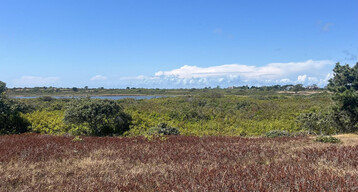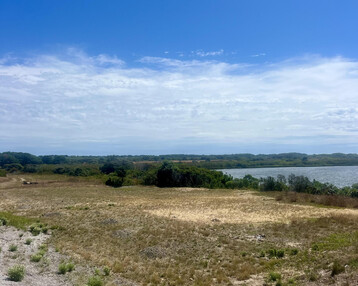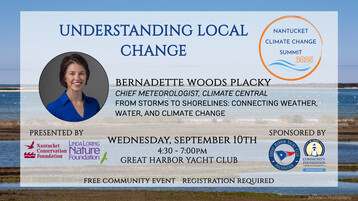Current Nature: Shifting Shorelines - Face to Face with Nantucket’s Changing Climate
Nathan Ernst, Conservation Research And Stewardship Intern, Linda Loring Nature Foundation •

In my time on the island, I’ve had the opportunity to speak with plenty of lifelong Nantucketers who’ve told me a plethora of stories of times past. Be it tales of colder winters, more expansive shorelines, or a greater abundance of fish and wildlife, it’s clear that those times are just that — of the past. Amongst the conversations I’ve had, there’s been one common denominator: change. This comes as no surprise, as our natural world sees more change every year, much of it due to anthropogenic climate change, with Nantucket being no exception. Understanding this, it’s up to us, the community, to decide how we adapt to it - because whether it’s worsening droughts or shifting shorelines, there’s no denying that the tides are changing here on Nantucket.
It's easy to become overwhelmed and disillusioned by the matter at hand, but all is far from lost. With ever-changing problems comes a batch of equally innovative solutions. Ranging from complex coastal resiliency plans to combat future sea-level rise to hands-on invasive species management, work is underway to ensure that we are equipped to adapt to a changing environment. Even here at the Linda Loring Nature Foundation, we make every decision with a long-term lens that focuses on improving our adaptability and resilience in line with a changing climate. In fact, our current restoration projects along the banks of Long Pond maintain an emphasis on adapting to future saltwater intrusion resulting from sea level rise. To do this, we engaged in adaptive retreat by removing a pre-existing structure along the banks of the pond with the goal of assisting the transition to a saltwater-tolerant wetland habitat. In doing so, we’re preemptively adapting to future change so the land can properly adapt. Not only are we preemptively adapting to change, but we are also monitoring it in real time through many of our research projects. In fact, both our phenology and water quality projects monitor how the property changes over time by collecting baseline data that allows us to detect future environmental change. As a conservation organization, we let the land lead us, and we can’t adapt to change without understanding it.

Although change is seemingly inevitable, we can still properly mitigate and adapt to it, but only if we, as a community, get involved. Many of us are already adapting to climatic changes without even knowing it - be it planting more drought-tolerant plants in your garden, changing the fish that you catch, or lowering your water usage in the summer, climate change adaptations are already underway.
In fact, the start of September marks the beginning of Climate Change Awareness Month; a month first signified by the Nantucket Select Board in 2020 to amplify awareness and action surrounding climate change on the island. In stride with these awareness efforts comes the 2025 Nantucket Climate Change Summit featuring keynote speaker Bernadette Woods Placky, Chief Meteorologist and VP of Engagement at Climate Central, giving a talk entitled, “From Storms to Shorelines: Connecting Weather, Water, and Climate Change,” after which there’ll be a social hour to connect with fellow community members. In her role as VP of Engagement, Woods Placky directs the Climate Matters Program, which introduces science-based climate reporting to local communities so they can better understand climate change alongside possible solutions. Presented by the Nantucket Conservation Foundation and the Linda Loring Nature Foundation, this year’s Summit focuses on the topic “Understanding Local Change” and is entirely free with pre-registration required. If registration is full or you can’t attend, the Summit will also be recorded for later viewing and will be available on the Nantucket Climate Summit website.

Climate change is evident wherever you go on the island; seen in the range expansion of new invasives such as the southern pine beetle, which has the potential to decimate native pitch pine populations, and in the ever-eroding shorelines that make up the island. It doesn’t stop there, as the effects of climate change are being felt from land to sea—growing seasons are shortened, and local fisheries are altered as species are pushed further north. In an ironic twist, Nantucket became popular for its island lifestyle and isolation, but that exact isolated island status is what renders it the most vulnerable to a changing climate. On an island such as Nantucket, adapting and increasing resiliency isn’t a choice; after all, there’s nowhere else to go. In an almost literal sense, it’s sink or swim. Given this, nothing is more important in combating the shared issue of climate change than community discourse and involvement, and the 2025 Nantucket Climate Summit serves as the perfect platform for both researchers and community members alike.
So yes, at this point, change may be inevitable, but how we adapt to it is up to us, and if we act accordingly, maybe we all can enjoy the Nantucket of the future just as those enjoyed the Nantucket of times past.